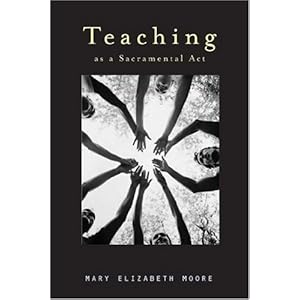Today I have a review of Teaching as a Sacramental Act by Mary Elizabeth Mullino Moore, a professor-turned-dean and ordained deacon in the United Methodist Church. I found a lot of inspiration on Moore’s book and hope you’ll give it a closer look. You can also read, rate, and comment on my review at Amazon.
We collect wisdom and this is a wisdom book. Teaching is quickly described as something which is not “about,” “for,” or “by way of” the sacraments but can be approached in such a way that it is a holy experience, it becomes sacramental (5). In this way, one can set aside the frenetic energy sometimes needed to teach and take time and energy to focus on the art of teaching as a blessing. Professor Moore collects the wisdom of inspirational Christian and spiritual leaders who, coming from different contexts across time and space, have all influenced her theology of teaching. Perhaps it’s because I’ve already drank from the well of so many whom she affords attention that the wisdom seemed to run so deep (Maya Angelou, Rita Nakashima Brock, Walter Brueggemann, Martin Luther King, Sallie McFague, Thomas Merton, Jürgen Moltmann, Parker Palmer, Oscar Romero, Desmond Tutu, John Wesley – the list goes on!).
More importantly, Moore takes what are sometimes seen or depicted as two separate things – life and faith – and intentionally mashes them together. Short stories of persons confronting each other, loving each other, trying to learn how to better dwell together serve as examples that get lifted up from life and viewed through a sacramental lens. They are like brief case studies in which the reader is invited to reflect on what is the teachable moment in each and how does dipping into various hermeneutics help one approach each situation with empathetic perspective.
The book is a reminder of the holy power of teaching in fresh ways. Moore ties Dr. King’s iconic “I Have a Dream” speech to resurrection of Christ and a “re-membering” of the Body in the march on Washington (37-38, 116). She touches upon indigenous concepts such as harambee in Kenya, ubuntu in Namibia, and minjung in Korea as natural companion pieces to Christian love (26, 80-81, 87). And she makes several ties between Biblical narratives and pressing contemporary matters (for example, the stories of Moses or Ruth and Naomi speak to immigration today) (33, 153).
Finally, I really appreciated Moore’s exploration of the concept of seeking reversals – to recognize and celebrate the challenge and gift of the paradox (94-96). In this, Moore acknowledges the mosaic of life, the ups and downs, and the living as simultaneous “sinner” and “saint” by several Biblical examples (109). This is particularly helpful as she lifts up several specific examples of teaching experiences and models. I feel like I gained new insight into how to approach the art of teaching (and learning).
I read Professor Moore’s book in a seminary course on education and I chose her book out of a list of options because I wanted to read something from a United Methodist perspective. While it is clearly from and for a Christian education perspective I could see non-Christians or persons who don’t consider themselves persons of faith gaining wisdom from this book. Thanks for reading. thelifemosaic
As an Amazon Affiliate, I earn from qualifying purchases. I get commissions for purchases made through links in this post.



Reblogged this on Ghost River Studios Blog and commented:
Imams have told me that teaching is the most honorable occupation, as have Rabbis, Christian ministers and clergy of many faiths. There is a specific solidity to the thought teaching is not just honorable, but a sacramental act; this is an excellent Christian perspective.
Thank you, Andrew, for spreading the word. It’s an excellent book and I appreciate you taking the time to read my review and the artwork featured on your blog is beautiful. I agree, there’s a lot of excellent interfaith wisdom for persons of all faith traditions to learn from one another.